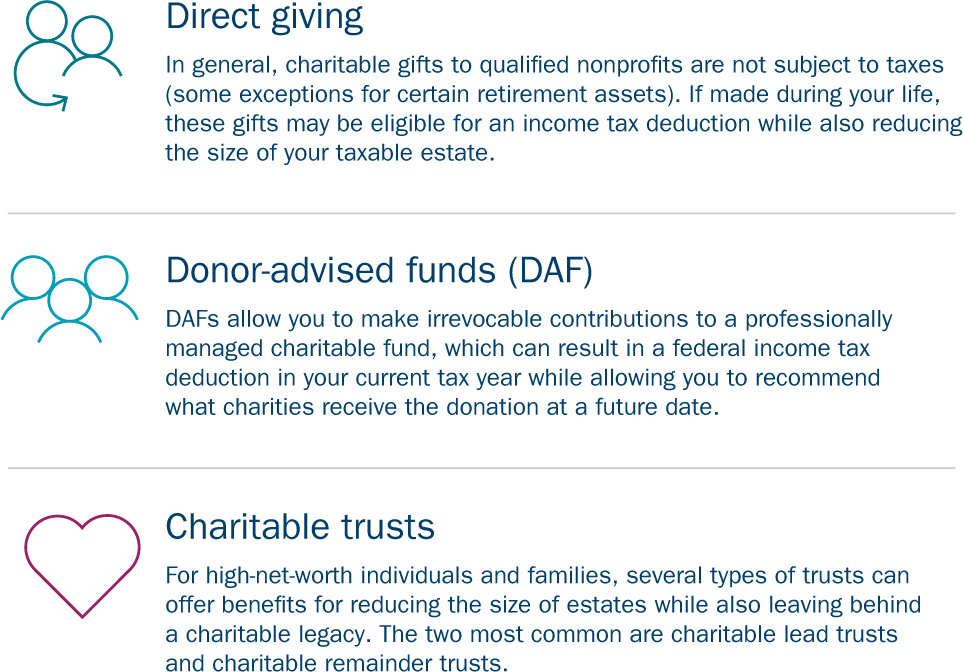Learn the top strategies to help reduce the taxable value of your estate so you can leave more behind for the people and causes you care about.

You’ve spent your life building something you can one day pass on to people and causes you care about most. But federal and state taxes can affect the value of the legacy you hope to leave behind.
Working with your estate planning team, we can help you evaluate different strategies to ensure more of your assets go exactly where you intend.
Here are strategies that can potentially help you preserve your estate for your heirs, while mitigating the impact of taxes:
In this article:
Lifetime gifting
The rules around tax-free giving can benefit your loved ones and advance your financial goals, while you're still alive. A few strategies to know:
- Lifetime gifting: One of the most effective strategies for reducing your taxable estate is also the simplest: Giving money directly to individuals during your lifetime. For 2025, federal tax law allows individuals to gift up to $19,000 per year (and $38,000 for a couple) to an unlimited number of individuals, gift tax-free — without the gifts counting toward your total federal lifetime gift and estate tax exclusion of $13.99 million (currently).
- 529 plans: Under special rules, you can “superfund” these college savings plans with a one-time contribution of up to five times the annual gift tax exclusion amount (for a total of $95,000 in 2025) — without incurring a gift tax or affecting your lifetime gift and estate tax exclusion. A person who chooses to take full advantage of the five-year spread for 529 plans would not be able to give additional gifts to that person during the five-year period without filing a gift tax return, unless the gift tax exclusion were increased, such as through an inflation adjustment in a subsequent year.
- Special spousal rules: You can avoid any estate taxes that might be due upon your passing by leaving your estate to your surviving spouse. Under the unlimited marital deduction, you can transfer any amount of money to a spouse while you’re still alive or at death — without incurring either federal gift or estate tax as long as both of you are U.S. citizens.
Charitable giving
Donating to charitable organizations is a meaningful way to leave a legacy, provide a lasting impact to causes or institutions you care about and generate significant tax benefits:

Learn more: Estate planning and charitable giving: Strategies to make an impact with your estate
Advanced trust solutions
Specialized trusts may be an effective strategy for reducing your taxable estate while taking care of loved ones after you’re gone. Here are some of the most common advanced trust solutions:
- Grantor retained annuity trusts let you move assets out of your taxable estate while allowing you to benefit from those same assets during your lifetime.
- Spousal limited access trusts can be effective for those concerned about gifting too much of their wealth during their lifetime.
- Qualified terminable interest property trusts are structured to provide for the living expenses of a surviving spouse while making sure children from a previous marriage still benefit from the estate.
Learn more: High-net-worth estate planning: When to consider advanced trusts in your plan
We’re here to help you plan your legacy
We can help you evaluate your options for preserving your estate and deepening its impact on the people, institutions and causes you care about most.